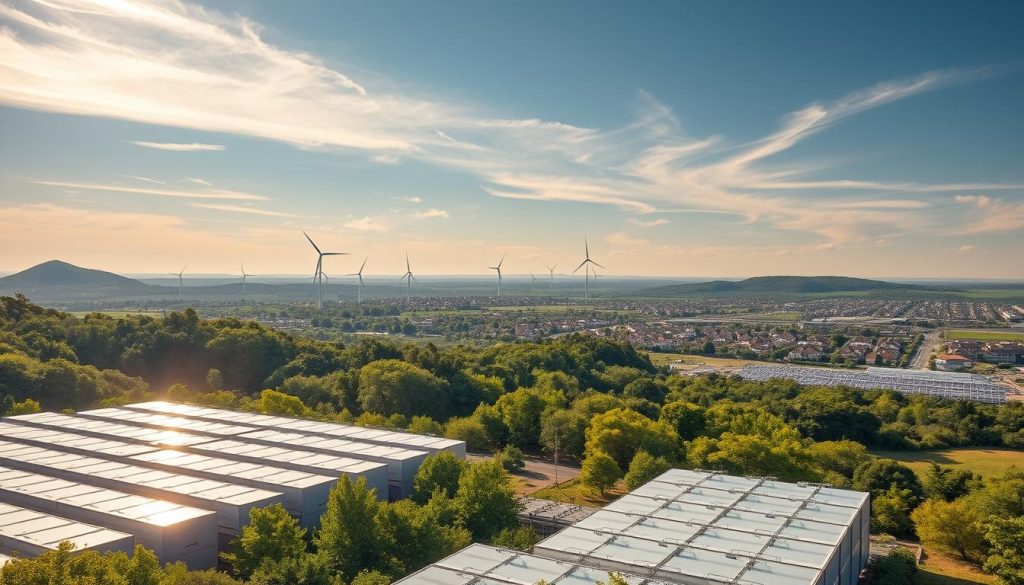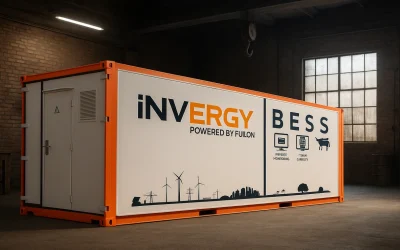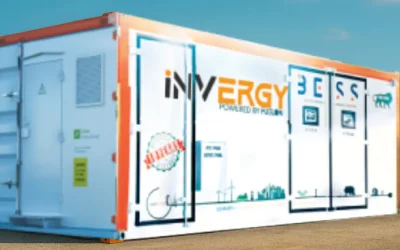Battery Energy Storage Systems (BESS) are becoming key for better energy management in commercial and industrial projects in India. With electricity prices going up and energy demand rising, businesses are looking at BESS. It helps them save on energy costs and work more efficiently.
These systems offer great energy storage solutions. They also help companies use more sustainable energy. As we explore BESS’s uses, it’s clear it’s playing a big role in changing how we use energy.
Key Takeaways
- BESS enhances operational efficiency in both commercial and industrial projects.
- Effective energy storage solutions are vital amidst rising energy costs.
- Implementing BESS can drive sustainability efforts across sectors.
- Businesses can significantly reduce energy expenses through BESS.
- Understanding BESS is key to optimizing energy management practices.
Introduction to BESS and Its Importance in Energy Management
Battery Energy Storage Systems (BESS) are key in managing energy, mainly in India. They help store energy from renewable sources, solving issues with changing electricity needs. As India shifts towards green practices, the need for better energy solutions grows.
In India, the fast rise of solar and wind energy means better storage tech is needed. BESS helps businesses use energy wisely, matching supply with demand. This makes them less reliant on old energy sources, boosting energy security.
Using BESS improves energy management and helps the planet. It cuts down on harmful emissions and makes energy grids more stable. As India looks to grow its renewable energy, BESS will be vital for meeting energy goals.
Understanding Battery Energy Storage Systems (BESS)
Battery Energy Storage Systems (BESS) are key for managing energy today. They use battery technology to store and release electricity when needed. Lithium-ion batteries are a top choice because they pack a lot of energy and work well.
These batteries charge and discharge quickly. This makes them perfect for many uses.
Energy storage systems like BESS help keep the grid stable. They store extra energy when it’s not needed and use it when it is. This helps match energy supply and demand in real time.
This is very important as we use more solar and wind power. These sources can be unpredictable, but BESS fixes this problem.
Using energy storage solutions helps companies save money and support green goals. As we all want cleaner energy, BESS is a big help. It makes our energy system stronger and better for the planet.
Key Applications of BESS in Commercial Projects
Battery Energy Storage Systems (BESS) are key for managing energy in commercial buildings. They help cut down energy costs and manage loads better. Two main uses are reducing demand charges and shaving peaks.
These uses tackle the issue of increasing energy costs. They also make operations more efficient.
Utilizing BESS for Demand Charge Reduction
Demand charges are a big part of electricity bills for businesses. BESS helps lower these costs. It stores energy when prices are low and uses it when prices are high.
This method cuts down on high demand peaks. It leads to big savings on energy bills.
Peak Shaving Strategies with BESS
Peak shaving with BESS helps manage energy use during busy times. It releases stored energy to ease grid strain and keep costs low. This method also keeps energy flow stable and reliable.
Integrating BESS in Industrial Applications
Battery Energy Storage Systems (BESS) have changed the game in industrial settings. They help solve problems with power quality and frequency. For industries, stable power is key for smooth operations. BESS improves power quality, protecting equipment and keeping things running smoothly.
Power Quality Improvement through BESS
Power quality issues can really mess up industrial work. They can hurt productivity and shorten equipment life. BESS systems fix this by controlling voltage and smoothing out frequency.
They soak up extra energy when it’s not needed and release it when it’s busy. This keeps the power steady and saves sensitive gear from power swings.
Frequency Regulation and Its Significance
Keeping the frequency stable is critical for industrial operations. BESS helps adjust power to match demand changes. This boosts energy system reliability and efficiency.
Industries can better manage their power needs. This means no stops in production and lower costs from power issues and fines.
Backup Power Solutions with BESS
Battery Energy Storage Systems (BESS) are changing how businesses get backup power. They make sure power keeps flowing, even when it doesn’t from the grid. This keeps businesses running smoothly, even when power goes out.
In places like offices and factories, BESS fills the power gap during emergencies. Companies can switch to these systems fast, keeping important work going. This is key during big disasters, where being ready can save a lot of trouble.
Using BESS helps businesses get back on track after disasters. They can plan ahead, knowing they have a power backup. This makes everyone more confident and shows a strong commitment to staying strong through tough times.
Cost Optimization through BESS in Energy Consumption
Battery Energy Storage Systems (BESS) help businesses save money on energy. They manage peak demand and boost energy efficiency. This makes BESS a smart choice for companies wanting to cut costs.
Analyzing Cost-Benefit Scenarios for Businesses
Looking at cost-benefit scenarios shows BESS’s benefits. Companies save on energy by using it less during high prices. This cuts costs now and improves finances over time.
Financial Incentives for BESS Implementation
The Indian government offers financial help for BESS. This makes it easier for companies to invest. Grants, tax breaks, and subsidies help lower the cost. Companies can use these to save more on energy and do better financially.
Implementing BESS in Utility Projects
Battery Energy Storage Systems (BESS) are changing how we manage energy. They help improve grid management and support big projects. Utilities use BESS to keep the grid stable, handle high demand, and provide power when it’s needed most.
Adding BESS to utility projects boosts efficiency and cuts costs. It makes it easier to use energy from the sun and wind. This makes the energy system stronger and helps meet the need for clean energy.
But, adding BESS to old systems is a challenge. It needs careful planning and new tech. Despite this, the benefits are worth it. They lead to lasting, cost-effective energy solutions.
Case Studies of Successful BESS Implementations
Looking at real examples gives us great insights into using battery energy storage systems (BESS) in India. These stories show how BESS has helped businesses and industries. They highlight the benefits and the challenges faced, teaching us valuable lessons for the future.
Examples from the Indian Commercial Sector
In Mumbai, a big retail chain used BESS to cut down on grid energy use during busy times. This move saved them a lot of money and made their energy use more reliable. A hotel chain also used BESS to shift their energy use, saving on bills without affecting guest comfort.
Lessons Learned from Industrial Applications
A big textile plant in India learned a lot from using BESS. They found out how important it is to size the system right for their needs. They also learned that doing a detailed study before starting is key to saving money and getting government help.
The Role of BESS in Sustainable Energy Practices
Battery Energy Storage Systems (BESS) are key to making energy use more sustainable. They help mix renewable energy like solar and wind into our energy systems better. This makes energy use more efficient and helps cut down on greenhouse gases, which is good for India’s clean energy goals.
BESS can store energy from the sun and wind. This means we can use more energy when it’s sunny or windy. It also means we don’t have to rely as much on dirty fossil fuels, helping us move towards a greener future.
Adding BESS to our energy mix does more than just store energy. It makes our energy system stronger and more flexible. This is important because renewable energy sources can change a lot, and BESS helps handle these changes well.
In India, BESS is becoming more important as the country works towards clean energy goals. Investing in BESS helps reduce greenhouse gases and leads to a better, greener future for everyone.
Challenges and Considerations in BESS Deployment
Deploying Battery Energy Storage Systems (BESS) comes with its own set of hurdles. It’s important to understand these challenges to ensure a smooth setup. Technology barriers can slow down progress, as not all systems are ready for new battery tech. Also, the cost of buying, setting up, and keeping these systems running can be high.
When it comes to BESS, safety is a top priority. Keeping these systems safe is key to avoiding accidents and risks. This means following safety rules and doing regular checks. Companies thinking about using BESS need to consider these points to make the right choice for their needs.
Future Trends of BESS in the Commercial & Industrial Landscape
The commercial and industrial sectors are on the verge of a big change. This change comes from advancements in Battery Energy Storage Systems (BESS). New battery tech, like solid-state batteries, will make energy storage more efficient.
Rules are changing to help BESS grow, showing a bright future. There are now more chances to use green energy and storage together. Companies are putting money into smart tech. This tech uses AI to better manage energy, keep systems running smoothly, and watch energy use in real-time.
As people want to cut down on carbon emissions, BESS will be key. Companies that use these new techs will save money and have a reliable energy supply. They will also stay ahead in the market for a long time.
Conclusion
Battery Energy Storage Systems (BESS) are redefining how India’s commercial and industrial sectors manage energy. From peak shaving to backup power, Invergy BESS solutions deliver efficiency, cost savings, and sustainability.
By adopting Invergy’s advanced systems, businesses not only optimize energy use but also contribute to India’s clean energy vision.
Ready to optimize your energy strategy? Explore INVERGY and discover how our BESS solutions can power your business forward.





0 Comments